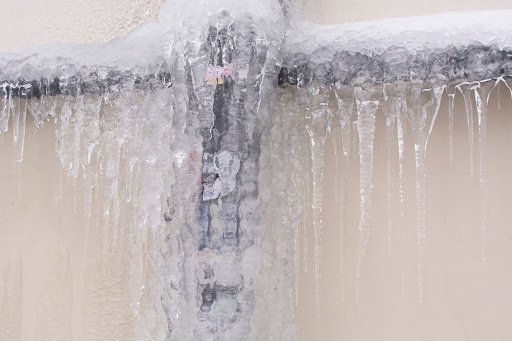As temperatures plunge and the chill of cold weather grips our homes, the specter of frozen pipes becomes a pressing concern for most homeowners. Understanding the dynamics of frozen pipes and the steps to prevent them can save you from the nightmares of burst pipes and extensive water damage.
Dive deep into the world of frozen pipes, exploring everything from why pipes freeze to how you can effectively deal with them, especially the critical decision — should you turn off water if pipes are frozen?
Understanding Frozen Pipes: The Cold Reality
Frozen pipes occur when water inside your pipes turns to ice due to freezing temperatures. This is more common in pipes located in unheated areas, near exterior walls, or in crawl spaces. As the ice forms, it expands, increasing water pressure in the pipe. This pressure is what can lead to burst pipes, a costly and damaging problem for any homeowner.
The Science Behind Pipe Freezing and Bursting
When water freezes, it expands by about 9%. This might not seem much, but in the confined space of a water pipe, this expansion creates significant pressure. The pipe bursts not where the ice blockage occurs but rather downstream, between the ice blockage and a closed faucet. This is because the pressure increase is not from the expanding ice but from the continued freezing and expansion of water further back in the pipe.
Should I Turn Off the Water When Pipes Freeze?
- Identifying the Frozen Pipe: The first step is identifying the frozen area. This can often be a section of the pipe that is noticeably colder, has frost on it, or is bulging.
- Shutting Off the Main Water Supply: If you discover a frozen pipe, the first course of action should be to shut off the main water supply. This reduces the water pressure, minimizing the risk of a pipe bursting.
- Contacting a Plumber: Get in touch with an emergency plumber in Denver, CO, immediately, as they can help to prevent pipes from bursting.
- Thawing the Pipe: As you’re waiting for a trusted plumber to show up, you can begin to thaw the pipe. It’s crucial to open the faucet that the pipe feeds to allow water to flow out as the ice melts.
Safe Thawing Techniques
Thawing pipes should be done with great care to avoid damaging the pipes or causing a fire. Never use an open flame, such as a propane torch, due to the fire risk. Instead, use a hair dryer, a space heater, or warm towels. Start thawing closest to the faucet and work your way towards the frozen area. This allows the melting ice to flow out and reduces pressure in the pipe.
Preventing Pipes From Freezing: Proactive Measures
Insulation and Protection
- Insulate Water Pipes: Insulating your water pipes is one of the most effective ways to prevent them from freezing. Pipes in unheated areas or exposed to the exterior walls should be prioritized.
- Seal Leaks: Check for leaks in your home that could let cold air in, particularly in areas where pipes are located. Even small openings can let in enough cold air to cause a pipe to freeze.
Keeping the Heat In and the Cold Out
- Thermostat Set Consistently: Keep your thermostat set to a consistent temperature day and night. Even if it increases your heating bill, it can prevent a much more costly repair job if pipes freeze and burst.
- Open Cabinet Doors: In extremely cold weather, open cabinet doors to allow warm air to circulate around plumbing, especially if your sink is on an exterior wall.
- Let Faucets Drip: Letting a faucet drip during extreme cold weather can prevent a pipe from bursting. It relieves pressure build-up in the pipes between the ice blockage and the faucet.
Specialized Tips for Specific Areas
- Protecting Hose Bibs and Garage Doors: For hose bibs, shut off the water and drain them. For garage doors, keep them closed as much as possible to prevent cold air from freezing pipes in the garage.
- Attention to Crawl Spaces and Attics: Insulate and heat these spaces if possible. This not only helps prevent frozen pipes but also contributes to overall energy efficiency in your home.
When to Call a Professional
Sometimes, the situation might be beyond what you can handle. If you’re unsure about how to proceed, if the pipe has already burst, or if you can’t locate the frozen area, it’s time to call in the professionals. Squeak’s Plumbing Heating & Air offers expert services in frozen pipe repair in Denver, CO, and can guide you through the process safely and efficiently.
Don’t Let Frozen Pipes Burst Your Bubble
Frozen pipes can be a daunting challenge, but with the right knowledge and preparation, you can prevent and manage them effectively. Remember, keeping your pipes warm and insulated, along with a vigilant eye during cold weather, can save you from the turmoil of dealing with burst pipes.
Don’t wait for a burst pipe to take action. Contact Squeak’s Plumbing Heating & Air today for expert advice and services in preventing and repairing frozen pipes. Stay ahead of the cold and keep your water flowing smoothly all winter long!





